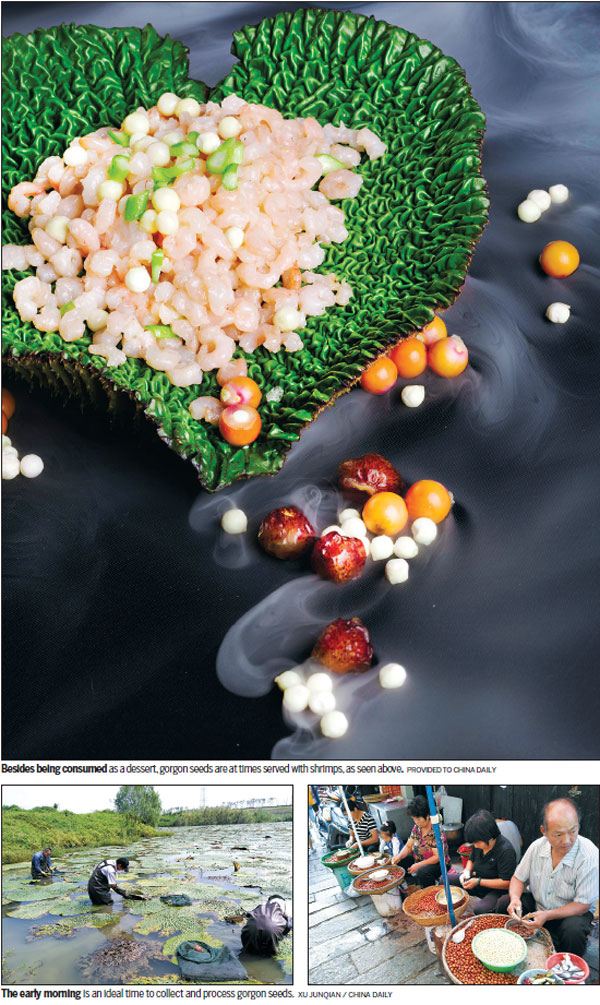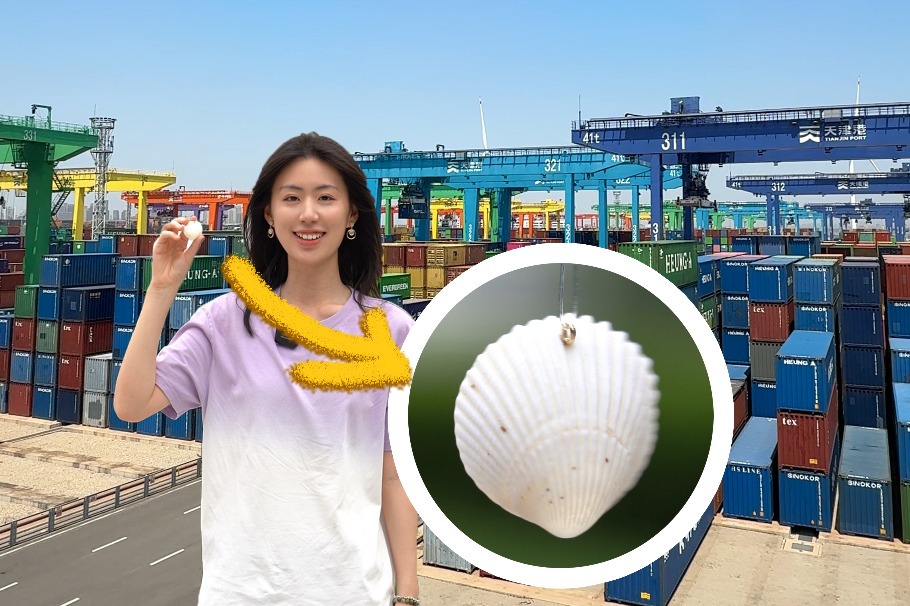The coveted seed from Suzhou

Gorgon seeds are a must-have autumn food for the people of Suzhou and they don't mind paying top dollar for it
Since nine o'clock in the morning, Hu Xiuxia has been sitting on a small stool outside a green tea shop at the entrance to Fengmen Market, the oldest wet market in Suzhou, Jiangsu province.
Here, she tirelessly extracts seeds from a pomegranate-like plant called the gorgon fruit, an aquatic plant that has for centuries been grown and consumed exclusively in Suzhou. The gorgon plant has a huge table-sized green leaf and light purple flowers that bloom late in summer.
Behind her is a pile of pink shucks that have been piled to waist height. In front of her are white seeds the size and shape of pearls.

From late August to mid October every year, the time when gorgon seeds become edible, hundreds of middle aged or elderly women would gather at the entrances of local wet markets and put up a "performance" - peeling the seeds off the fruit. The only props they have are wooden stools and thumb cots made of iron.
The locals at times refer to this activity as "peeling rice from the chicken head" because of the fruit's resemblance to the latter.
It has already been three hours, but the 55-year-old Hu barely looks exhausted. An experienced person could peel an average of 2 to 3 kilograms of seeds every day. It takes 10 kg of fruits to produce just 1 kg of seeds.
The job of peeling the seeds from the gorgon is done almost exclusively by women, who explained that men don't have the patience for such a job.
Every autumn, droves of pop-up gorgon fruit peelers like Hu arrive at Fengmen Market to sell the seeds. This year, the administration office of Fengmen Market has decided to set aside a space the size of a basketball court for them to do business in a bid to prevent conflicts from arising between them and the regular market vendors.
Gorgon seeds are as coveted to a Suzhou native as truffles are to an Italian. The increasing demand from both within Suzhou and other cities has also been pushing the price of the seeds up.
While farmers at Suzhou's Taihu Lake, China's second largest freshwater lake, sell the fruit at a wholesale price of less than $2 per kilogram, the seeds retail for $35 per kilogram at the wet markets.
Renting a space at locations like Fengmen Market, the busiest and most central one in the city, costs about $10 every day.
According to Bao Zhongzhou, a senior agronomist with Jiangsu Shengyuan Aquatic Vegetable Research Center in Suzhou, it was not until late in the 1980s that the gorgon fruit became popular and was grown in the lowland ponds outside Suzhou.
Due to urbanization, farmers had to move from Suzhou to the more remote areas to grow the plant. The total farming area in China for the gorgon fruit is estimated to be around 67,000 square kilometers.
Veteran foodies insist that the gorgon fruit grow best in the waters of Taihu Lake, and that they are best handled by the hands of Suzhou women.
The seeds are classified as among the eight "water treasures" in China, alongside lotus roots, water celery and water chestnuts, all of which are signature ingredients in Suzhou cuisine.
Chef Zhao Bangyin from Shang Palace, the Chinese restaurant at Shangri-La Suzhou, noted that the change in seasonal vegetables and ingredients is so frequent that chefs here are actually inspired, if not forced to, update their menus on a monthly basis.
Ye Ting, a prominent local food critic, said that the period during which gorgon seeds are sold is so important in the local culinary calendar that the occasion is akin to the Chinese New Year.
Gorgon seeds don't actually have a particularly unique flavor except for a subtle sweetness. People fond of consuming these seeds often say that it is the special texture, one similar to coix seeds, they are paying for.
Most locals consume the seed as a dessert and the preparation method is utterly simple. The seeds are boiled - water from Taihu Lake is supposedly the best - before a handful of osmanthus flowers are sprinkled over and a spoonful of honey added. Restaurants often serve this dessert in pumpkins or papayas instead of bowls.
"When you have the best ingredients, it would be a disaster to spoil it with any more flavoring," said Zhao.
Other dining establishments have also been known to serve gorgon seeds with stir-fried shrimps.
Suzhou natives are so fastidious about the gorgons that a bowl of seeds that has been in the open for two hours fetches 10 yuan less than freshly peeled ones. The freshest are always snapped up by the locals.
Anyone from outside Suzhou gets the rest.
xujunqian@chinadaily.com.cn

(China Daily USA 10/07/2016 page9)
Today's Top News
- There is no alternative to multilateralism
- Beijing ready to face US trade arrows
- Strategic autonomy of vital importance to EU
- Campaign still motivates Chinese eight decades on
- Basalt study reveals moon's asymmetry
- Vice-premier calls for more efficient policy implementation































